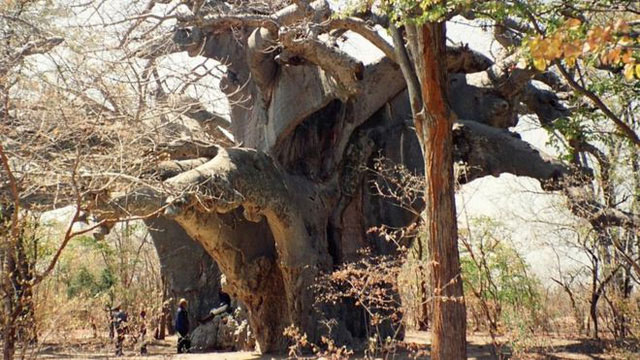Thousands of years old trees in Africa mysteriously died
The baobab tree - an ancient tree considered to be a symbol of the African steppe, was found dead mysteriously.
According to the BBC, international scientists found that most of the largest and oldest baobab trees in Africa died in the past 12 years without a clear cause.
The team, from universities in South Africa, Romania and the US, said the loss was "an unprecedented event".

Panke, the oldest baobab in Africa is now dead - (Photo: JOCELYN ALEXANDER).
In Nature Plants, the team said that the number of trees died was not due to disease. They suspect climate change may be relevant even without direct evidence.
Previously, researchers visited ancient trees in southern Africa since 2005, using radioactive carbon to measure their age and structure.
Unexpectedly, they discovered 8 of the oldest 13 baobab trees and 5 of the 6 largest baobab trees died completely or died partially. These trees - scattered in Zimbabwe, Namibia, South Africa, Botswana and Zambia, range from 1,000 to over 2,500 years.
"We suspect this is related to drought and rising temperatures , " said Dr Adrian Patrut of Babes-Bolyai University in Romania. However, he said further research is needed to confirm this hypothesis.
also known as "dead mice" due to their fruit shape. The characteristic of the tree is its stout body and a large amount of water that helps it withstand the dry weather.
Plants can grow to a very large size and can live hundreds to thousands of years.
- Thousands of fish drifted ashore and disappeared mysteriously
- Thousands of people in Africa die from cholera
- Da Lat pine is standing dead
- Big tree as fast as blowing
- A 3,000 year old olive tree still bears fruit
- Alarming the decline of old trees
- Napoleon's hair mysteriously appeared in Australia
- China discovered 56m long fossil tree breaking world record?
- India grows 50 million trees in just one day
- The Dead Sea is dying
- Large flood in Africa
- 800 tons of bamboo shoots mysteriously died
 Why do potatoes have eyes?
Why do potatoes have eyes? 'Tragedy' the world's largest carnivorous life: Death becomes ... public toilet
'Tragedy' the world's largest carnivorous life: Death becomes ... public toilet Tomatoes were once considered 'poisonous' for 200 years
Tomatoes were once considered 'poisonous' for 200 years Detecting microscopic parasites on human face
Detecting microscopic parasites on human face